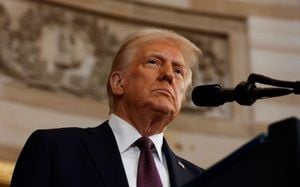Former national security adviser John Bolton has reported the termination of his Secret Service protection by President Donald Trump, just hours after Trump was sworn in for his second term. Bolton, who has frequently criticized Trump and had previously been under threat from Iranian operatives, expressed disappointment but no surprise at the decision.
Bolton disclosed the news on social media platform X, stating, "I am disappointed but not surprised." He pointed out the former President's earlier decision to revoke his protection, which had been granted during Biden's administration due to significant risks against him stemming from Iran.
The specific threats against Bolton have been serious. According to the U.S. Justice Department, charges were filed against Shahram Poursafi, an Iranian operative, for allegedly attempting to hire someone to assassinate Bolton. This was reportedly motivated by Bolton's role in the U.S. drone strike against Iranian General Qassem Soleimani, executed on Trump’s orders.
Bolton continued, "Notwithstanding my criticisms of President Biden's national security policies, he nonetheless made the decision to extend Secret Service protection to me in 2021." His comments draw attention to the intense political rivalry between him and Trump, particularly considering Bolton's view of Trump as “not fit to be president,” as expressed in his memoir.
The timing of the revocation came just as Trump is working to reshape his administration after taking office again, reinforcing possible political motivations behind his actions. Bolton, who served under Trump from 2018 until he was dismissed the following year, has consistently been at odds with the former president over foreign policy approaches, particularly concerning Iran.
Compounding the political intrigue of this situation, Trump’s administration has seen numerous threats toward its former officials, particularly due to the fallout from the killings of Iranian military leaders. Trump also signed an executive order aimed at revoking security clearances from multiple former officials, including Bolton, claiming their actions and disclosures had jeopardized sensitive information.
Many observers are now questioning the safety of both Bolton and others who served on Trump's national security team, as threats from Iranian factions continue to loom. Bolton labeled the attempts on his life as remaining active and has remained vocal about the necessity of maintaining security for those directly impacted by U.S. foreign policy decisions.
Despite the lack of comments from the Secret Service and the White House on specifics related to Bolton's security detail, the ramifications of Trump’s decision to revoke protection are far-reaching. With the growing tensions surrounding Iran, many speculate this choice could exacerbate existing threats against Bolton and lead to greater scrutiny of Trump’s handling of national security matters.
The complexity of the relationships and memories from Bolton's tenure under Trump remind us of the often volatile nature of U.S. politics. Though both Bolton and Trump have critiqued each other harshly, the former national security adviser needs no reminder of the very real threat from Iranian operatives and operatives acting on their behalf.
Bolton’s case exposes broader concerns about how politics intertwines with personal safety, especially when considering the past animosities and decisions made during turbulent administrations. With threats remaining unresolved, many are left to weigh not only the political ramifications but the personal safety of those who have once held high-ranking positions within the government.



